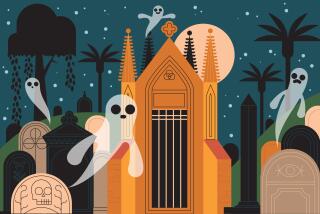Local Planetariums Put the Stars Almost Within Reach
- Share via
Planetariums offer Southern Californians the opportunity to explore the moon, the sun, the stars and other celestial landmarks.
“The planetarium is like a zoo, showing you things that don’t exist in your neighborhood any longer,” said John Mosley, program supervisor at Griffith Observatory in Los Angeles.
A planetarium, he said, lets whoever is operating it “manipulate” the sky.
“From your own back yard, it’s pretty static. But in a planetarium, we can accelerate time, we can watch the motions of a planet through months and see eclipses happen,” Mosley said.
Regularly scheduled public programs and special shows are offered at the following Southland planetariums:
* Griffith Observatory, Planetarium and Hall of Science in Los Angeles: The large telescope on the roof is open for free viewing on clear nights (except Mondays) from dark until 9:45 p.m.
The Hall of Science, which features exhibits on astronomy and the physical sciences, opens at 2 p.m. Tuesdays through Fridays and 12:30 p.m. Saturdays and Sundays and closes at 10 p.m. Closed Mondays.
Admission to planetarium shows is $3 for adults, $2 for seniors 65 and older, $1.50 for ages 5-12. Children under 5 are admitted only to special 1:30 p.m. shows. Laserium shows require separate admission. Call (818) 997-3624.
The observatory is located at 2800 E. Observatory Road, at the north end of Vermont Avenue, on the south side of Griffith Park, (213) 664-1191 or (213) 664-1181.
* Reuben H. Fleet Space Theater and Science Center in San Diego: Before every main Omnimax film feature is a 10-minute planetarium show related to the film.
Daily show times are 2:30, 5:30 and 8 p.m., with an 11:30 a.m. show Saturdays and Sundays. Admission is $5 for adults, $3 for juniors ages 5-15, $3.50 for seniors 60 and over. Children under 5 are free.
Beginning July 17 (and thereafter on the first Tuesday of each month), the 7 p.m. program will be a full-length planetarium show designed to familiarize visitors with the night sky. These programs, led by an astronomer, will precede stargazing with telescopes.
The Science Center, which has hands-on exhibits for all ages, is open 9:15 a.m. to 9:30 p.m., Sundays-Thursdays, and until 10:30 p.m. on Fridays and Saturdays. The theater is located in Balboa Park, (619) 238-1168.
* Los Angeles Valley College Planetarium in Van Nuys: The Los Angeles Valley College Astronomy Club offers planetarium shows one weekend a month, on Fridays at 8 p.m. and Saturdays at 2 p.m.
Admission is $3.50 for adults, $2 for children 5-16 years. Children must be at least 5 to be admitted. After the show, the public is invited to the observatory to use the club’s telescopes.
The planetarium is situated at the southwest corner of campus between the math/science and engineering buildings, 5800 Fulton Ave., Van Nuys, (818) 781-1200, Ext. 335.
* Palomar College Planetarium in San Marcos: Planetarium programs are presented the first Wednesday of the month, September through May.
Palomar College is located at 1140 W. Mission Road in San Marcos, (619) 744-1150, Ext. 2512.
* Rancho Santiago College Planetarium in Santa Ana: Hourlong planetarium programs are presented Sundays at 2 p.m. by members of the Orange Country Astronomers.
Admission is $2 for adults, $1 for children 12 and under. The college is located on 17th Street at Bristol in Santa Ana, (714) 667-3096.
* El Camino College Planetarium in Torrance: A planetarium show is presented 8-9 p.m. every Friday when college is in session, September through May.
After the show, weather permitting, visitors can peer through the 16-inch Celestron telescope on the observatory roof.
Admission is $1.50 for adults, $1 for children 12 and under. The auditorium has only 77 seats, so tickets must be ordered ahead by phone.
The college is located at 16007 Crenshaw Blvd., Torrance, (213) 715-3200.
* Santa Monica College Planetarium: Two planetarium shows are presented every Friday night when college is in session, September through July.
Planetarium director John Hodge leads “The Night Sky Show,” a 45-minute continuously updated introduction to the changing night sky, offered at 7 p.m. each Friday.
Single tickets to any show are $3 per person. If the weather is clear, visitors may look through the observatory’s rooftop telescope, open from 9-10:30 p.m.
The planetarium is on the second floor of the Technology Building, on Pico Boulevard between 17th and 18th streets, (213) 452-9223.
More to Read
Sign up for The Wild
We’ll help you find the best places to hike, bike and run, as well as the perfect silent spots for meditation and yoga.
You may occasionally receive promotional content from the Los Angeles Times.






